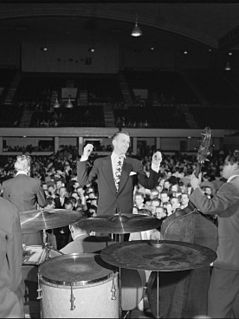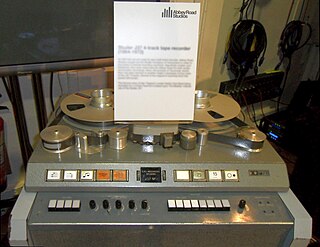Related Research Articles

Psychedelic rock is a diverse style of rock music inspired, influenced, or representative of psychedelic culture, which is centred on perception-altering hallucinogenic drugs. The music is intended to replicate and enhance the mind-altering experiences of psychedelic drugs, most notably LSD. Many psychedelic groups differ in style, and the label is often applied spuriously.

Progressive music is music that attempts to expand existing stylistic boundaries associated with specific genres of music. The word comes from the basic concept of "progress", which refers to development and growth by accumulation, and is often deployed in the context of distinct genres such as progressive country, progressive folk, progressive jazz, and progressive rock. Music that is deemed "progressive" usually synthesizes influences from various cultural domains, such as European art music, Celtic folk, West Indian, or African. It is rooted in the idea of a cultural alternative and may also be associated with auteur-stars and concept albums, considered traditional structures of the music industry.
Pop music is a genre of popular music that originated in its modern forms in the US and the UK during the mid-1950s. The terms "popular music" and "pop music" are often used interchangeably, although the former describes all music that is popular and includes many diverse styles. "Pop" and "rock" were roughly synonymous terms until the late 1960s, when they became quite separated from each other.
African-American English (AAE), also known as Black English in American linguistics, is the set of English dialects primarily spoken by most black people in the United States and many in Canada; most commonly, it refers to a dialect continuum ranging from African-American Vernacular English to a more standard English. African-American English shows variation such as in vernacular versus standard forms, rural versus urban characteristics, features specific to singular cities or regions only, and other sociolinguistic criteria. There has also been a significant body of African-American literature and oral tradition for centuries.

William Jerome Flannery, September 30, 1865 – June 25, 1932) was an American songwriter, born in Cornwall-on-Hudson, New York of Irish immigrant parents, Mary Donnellan and Patrick Flannery. He collaborated with numerous well-known composers and performers of the era, but is best-remembered for his decade-long association with Jean Schwartz with whom he created many popular songs and musical shows in the 1900s and early 1910s.

Okeh Records is an American record label founded by the Otto Heinemann Phonograph Corporation, a phonograph supplier established in 1916, which branched out into phonograph records in 1918. The name was spelled "OkeH" from the initials of Otto K. E. Heinemann but later changed to "OKeh". Since 1926, Okeh has been a subsidiary of Columbia Records, a subsidiary of Sony Music. Okeh is a Jazz imprint distributed by Sony Masterworks, a specialty label of Columbia.

Art music is music considered to be of high aesthetic value. It typically implies advanced structural and theoretical considerations or a written musical tradition. In this context, the terms "serious" or "cultivated" are frequently used to present a contrast with ordinary, everyday music.

William Grant Still was an American composer of nearly 200 works, including five symphonies and nine operas.
Discography is the study and cataloging of published sound recordings, often by specified artists or within identified musical genres. The exact information included varies depending on the type and scope of the discography, but a discography entry for a specific recording will often list such details as the names of the artists involved, the time and place of the recording, the title of the piece performed, release dates, chart positions, and sales figures.
Pop rock is rock music with a greater emphasis on professional songwriting and recording craft, and less emphasis on attitude. Originating in the late 1950s as an alternative to normal rock and roll, early pop rock was influenced by the beat, arrangements, and original style of rock and roll. It may be viewed as a distinct genre field, rather than music that overlaps with pop and rock. The detractors of pop rock often deride it as a slick, commercial product, less authentic than rock music.

Lo-fi is a music or production quality in which elements usually regarded as imperfections of a recording or performance are audible, sometimes as a deliberate aesthetic choice. The standards of sound quality (fidelity) and music production have evolved throughout the decades, meaning that some older examples of lo-fi may not have been originally recognized as such. Lo-fi began to be recognized as a style of popular music in the 1990s, when it became alternately referred to as DIY music.

Paul Hereford Oliver MBE was an English architectural historian and writer on the blues and other forms of African-American music. He was equally distinguished in both fields, although it is likely that aficionados of one of his specialties were not aware of his expertise in the other. He wrote some of the first scholarly studies of blues music, and his commentary and research have been influential.
"Some Sunday Morning" is the title of two well-known American songs. The first has music written by Richard A. Whiting with lyrics by Gus Kahn and Raymond B. Egan, and was recorded by Ada Jones and Billy Murray in 1917. The second has music by M.K. Jerome and Ray Heindorf, with lyrics by Ted Koehler, and was introduced in the 1945 film San Antonio by Alexis Smith.
Popular music is music with wide appeal that is typically distributed to large audiences through the music industry. These forms and styles can be enjoyed and performed by people with little or no musical training. It stands in contrast to both art music and traditional or "folk" music. Art music was historically disseminated through the performances of written music, although since the beginning of the recording industry, it is also disseminated through recordings. Traditional music forms such as early blues songs or hymns were passed along orally, or to smaller, local audiences.

"I've Got My Captain Working for Me Now" is a popular song written in 1919 by Irving Berlin. It was published by Music Publishers Inc. in New York, New York.
American music during World War II was considered to be popular music that was enjoyed during the late 1930s through the mid-1940s.
Edison Bell was an English company that was the first distributor and an early manufacturer of gramophones and gramophone records. The company survived through several incarnations, becoming a top producer of budget records in England through the early 1930s until, after it was absorbed by Decca in 1932, production of various Edison Bell labels ceased.

In music production, the recording studio is often treated as a musical instrument when it plays a significant role in the composition of music. Sometimes called "playing the studio", the approach is typically embodied by artists or producers who place less emphasis on simply capturing live performances in studio and instead favor the creative use of studio technology in completing finished works. Techniques include the incorporation of non-musical sounds, overdubbing, tape edits, sound synthesis, audio signal processing, and combining segmented performances (takes) into a unified whole.
References
- ↑ Jochen Eisentraut (2013). The Accessibility of Music: Participation, Reception, and Contact. Cambridge University Press. pp. 177, 196–197. ISBN 978-1-107-02483-0.
- ↑ Krummel, Donald William (1987). Bibliographical Handbook of American Music . University of Illinois Press. p. 113. ISBN 978-0-252-01450-5.
- ↑ Kenney, William Howland (2003). Recorded Music in American Life: The Phonograph and Popular Memory, 1890-1945. Oxford University Press. p. 11. ISBN 978-0-19-517177-8.
| This music-related article is a stub. You can help Wikipedia by expanding it. |